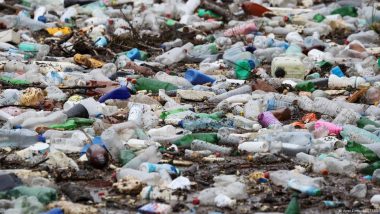Negotiators failed to sign a treaty curbing plastic waste after two years of discussions, as representatives from nearly 200 nations gathered in South Korea.Diplomats from nearly 200 countries gathered in Busan, South Korea, but failed in an attempt to agree on a landmark global treaty aimed at curbing plastic pollution.
Also Read | ‘Please Get Used to Seeing Me Regularly, Am Learning Malayalam Too’: Priyanka Gandhi Tells Wayanad's People.
The fifth and final UN Intergovernmental Negotiating Committee was unable to find consensus during a week of talks that would have capped two years of prior negotiations toward sealing a "high-ambition" treaty between "like-minded" nations.
Also Read | Bear Attack in Rajasthan: 35-Year-Old Woman Killed in Attack by Wild Animal in Pali While Collecting Wood.
Observers said the treaty would be one of the most significant environmental protection agreements ever signed, putting it alongside carbon emissions cuts anchored in the 2015 Paris Climate Agreement.
As the final plenary session began Sunday, two options were on the table.
The first, proposed by Panama and backed by some 100 countries, sought to create an avenue for establishing global plastic production cuts.
A second proposal did not include production caps.
Capping plastic production, managing plastic products and chemicals of concern, and financing assistance for developing countries to implement the treaty were all sticking points during the negotiations.
Critics: More talks won't fix 'serious problem' of plastic pollution
Luis Vayas Valdivieso, who chaired the meeting, called for more time to negotiate a deal.
Valdivieso said although progress had been made: "We must also recognize that a few critical issues still prevent us from reaching a comprehensive agreement. These unresolved issues remain challenging and additional time will be needed to address them effectively."
Eirik Lindebjerg, global plastics policy lead at WWF, an environmental NGO, had little patience for the failure, "We know what we need to do to end plastic pollution... simply adding more meetings is not the solution."
Russia and China block progress as production soars
A draft resolution from Busan describes plastic pollution as a "serious environmental and human health problem."
Studies link plastic production and waste to health concerns, including "infertility, obesity and non-communicable diseases including diabetes, cardiovascular disease and many cancers," according to the Scientists' Coalition for an Effective Plastics Treaty.
According to data provider Eunomia, China, India, Saudi Arabia, South Korea and the United States are the world's top five producers of polymer products.
The US and China were conspicuously absent from the summit's Sunday press conference of nations calling for a strong treaty.
Nations in favor of curbing plastic production say oil-producing countries have used delay tactics to prevent progress on a treaty. Without naming names, it is implied during the talks that Saudi Arabia and Russia have been most steadfast in this approach.
Plastic production is on course to triple by 2050 as scientists continue to find ever more microplastics in our bodies and our environment, including in our food and water supplies as well as the air that we breathe.
"If you're not contributing constructively, and if you're not trying to join us in having an ambitious treaty... then please get out," Fiji's Climate Minister Sivendra Michael said during the impasse on Sunday.
js/sms (AFP, Reuters)
(The above story first appeared on LatestLY on Dec 01, 2024 11:30 PM IST. For more news and updates on politics, world, sports, entertainment and lifestyle, log on to our website latestly.com).













 Quickly
Quickly


